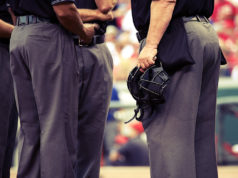I t may sound elementary, but for the most part there are three types of officials: rulebook attorneys, freelancers and a combination of both.
The rulebook attorneys are hypercritical. They memorize the rules, can quote casebook plays precisely without hesitation and are predominantly reactionary officials. When they see something happen, they react quickly, they apply the rule under all situations and move on to the next play. They are analytical in their officiating approach, almost engineering-like, never a variation.
Freelancers are not as well-versed, and usually study the rules only when they have to. They like to shoot from the hip and always try to “do the right thing,” no matter what the rulebook might say. They communicate more effectively with players and coaches and are less effective making quotes from the rulebook. They get through their games using common sense and cleverness.
Combination officials are the best of both worlds, merging the positive traits of the other two. They know the rules, apply them wisely and communicate effectively. The combination officials have “a balanced officiating philosophy.”
Philosophy is a Greek term for “love, study and the pursuit of wisdom and knowledge.” That applies greatly to what officials do. We love to officiate and love the sport(s) we officiate. Why else would we put up with the abuse that we receive from coaches and fans? We are students of the game and our pursuit of “wisdom and knowledge” for each individual sport is continuous, so that we become better officials. Simply stated, our philosophy is how we do business.
In broader terms, our philosophy defines who we are as officials, how we handle game situations and how the games we officiate are played.
Controlling the game is most important. How an official can control the game depends on his or her philosophy and mental quality pertaining to appearance, communication, method of handling conflicts and how they behave in tough situations. For most it can take years to develop and certainly your philosophy changes over time as you mature. Officials should have the wisdom and rules knowledge to make decisions that keep the good of their sport in the forefront.
Balanced people tend to be balanced officials.
Balanced people tend to be balanced officials. Those are the officials that can handle rules interpretation and application, yet don’t consume themselves with the rules to the extent that the game suffers. What is needed is a clear understanding of the inseparable link between the rules, their spirit and intent, and good-old common sense.
Balanced officials have an officiating philosophy that is accepted by their peers. Having a balanced philosophy allows you to see the entire play, take in all the appropriate information, delay the decision a split second to decide whether the action had positively or negatively impacted the play, then make the call or no-call. In general, balanced officials let the game come to them. Balanced officials have good communication skills, get along with all involved with the game and are not afraid to make the big call or no-call. That is the actual product of officiating. Officials are in fact rules interpreters on the playing surface.
Balanced officials make slight adjustments in their philosophy, not just over time throughout their career, but also according to the level of game they are working. For example, a ruling in a youth game is probably not enforced the same way in a higher level game.
Learning to adjust your philosophy to the level you are working is an important step.
Learning to adjust your philosophy to the level you are working is an important step. Remember to remain adaptable to game situations and to maintain a balanced officiating philosophy at all times. Develop techniques to achieve your goals without having to invoke your dominance. Balanced officials can make adjustments to each level they are working.
Rulebooks only prescribe what should be done when an event occurs. You can find out what is legal and not legal within the framework of the rules, but you have to learn and understand where and when to apply its content. Only through experience do you acquire the knowledge to identify each event. The intent of the rules and the enforcement of the rules have to meet the actions of the athletes. Part of the ability to officiate becomes being able to make the rules work within the game situation you have.
Officials can work an entire career trying to develop consistency in their understanding of the interpretation of the rules. Those are the officials who do not get nervous or excited, ruffled, red in the face or lose their temper. They always give the impression that “they have been here before.”
For more resources on developing a balanced officiating approach, consider the following:
The IT Factor in Officiating: What It Is and What It Will Do For You
What's Your Call? Leave a Comment:
Note: This article is archival in nature. Rules, interpretations, mechanics, philosophies and other information may or may not be correct for the current year.
This article is the copyright of ©Referee Enterprises, Inc., and may not be republished in whole or in part online, in print or in any capacity without expressed written permission from Referee. The article is made available for educational use by individuals.


















